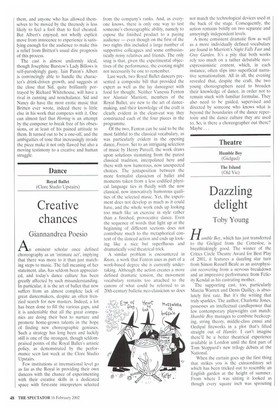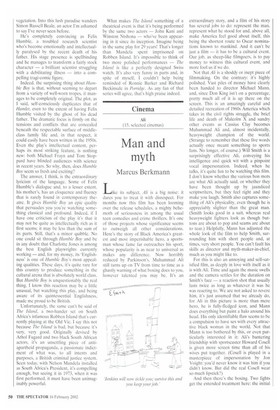Humble Boy (Gielgud) The Island (Old Vic)
Dazzling delight
Toby Young
Humble Boy, which has just transferred to the Gielgud from the Cottesloe, is breathtakingly good. The winner of the Critics Circle Theatre Award for Best Play of 2001, it features a dazzling star turn from Simon Russell Beale as an astrophysicist recovering from a nervous breakdown and an impressive performance from Felicity Kendal as his castrating mother.
The supporting cast, too, particularly Marcia Warren and Denis QuiIley, is absolutely first rate. But it's the writing that truly sparkles. The author, Charlotte Jones, possesses an intellectual candlepower that few contemporary playwrights can match: Humble Boy manages to combine beekeeping, string theory, middle-class ennui and Oedipal fireworks in a plot that's lifted straight out of Hamlet. I can't imagine there'll be a better theatrical experience available in London until the first part of Tom Stoppard's new trilogy debuts at the National.
When the curtain goes up the first thing that strikes you is the extraordinary set which has been tricked out to resemble an English garden at the height of summer. From where I was sitting it looked as though every square inch was sprouting vegetation. Into this lush paradise wanders Simon Russell Beale, an actor I'm ashamed to say I've never seen before.
He's completely convincing as Felix Humble, a troubled research scientist who's become emotionally and intellectually paralysed by the recent death of his father. His stage presence is spellbinding and he manages to transform a fairly stock character — a brilliant scientist struggling with a debilitating illness — into a compelling tragi-comic figure.
Indeed, the surprising thing about Humble Boy is that, without seeming to depart from a variety of well-worn tropes, it manages to be completely original. The plot. as I said, self-consciously duplicates that of Hamlet, even to the extent of having Felix Humble visited by the ghost of his dead father, The dramatic focus is firmly on the tensions and conflicts that are concealed beneath the respectable surface of middleclass family life and, in that respect, it could easily have been written in the 1950s. Even the play's intellectual content, perhaps its most striking feature, is nothing new: both Michael Frayn and Tom Stoppard have blinded audiences with science in recent years. So why, then, does Humble Boy seem so fresh and exciting?
The answer, I think, is the extraordinary lyricism of the language. Some of Felix Humble's dialogue and, to a lesser extent, his mother's, has an eloquence and fluency that is rarely found in contemporary theatre. It gives Humble Boy an epic quality that persuades you you're watching something classical and profound. Indeed, if I have one criticism of the play it's that it may not be quite as intellectually rich as it first seems; it may be less than the sum of its parts. Still, that's a minor quibble. No one could sit through Humble Boy and be in any doubt that Charlotte Jones is among the best English playwrights currently working — and, for my money, its 'Englishness' is one of Humble Boy's most appealing qualities. These days, it's quite rare for this country to produce something in the cultural arena that is absolutely world class. But Humble Boy is unquestionably the real thing. I know this reaction may be a little unusual, but watching this play, and being aware of its quintessential Englishness, made me proud to be British.
Unfortunately, the same can't be said of The Island, a two-hander set on South Africa's infamous Robben Island that's currently playing at the Old Vic. I say this not because The Island is bad, but because it's very, very good. Originally devised by Athol Fugard and two black South African actors, it's an unsettling piece of antiapartheid propaganda, a passionate indictment of what was, to all intents and purposes, a British criminal justice system. Seen today, with Nelson Mandela installed as South Africa's President, it's compelling enough, but seeing it in 1973, when it was first performed, it must have been unimaginably powerful, What makes The Island something of a theatrical event is that it's being performed by the same two actors — John Kani and Winston Ntshona — who've been appearing in it since its inception. Imagine being in the same play for 29 years! That's longer than Mandela spent imprisoned on Robben Island. It's impossible to think of two more polished performances — The Island is like a perfectly designed Swiss watch. It's also very funny in parts and, in spite of myself, I couldn't help being reminded of Ronnie Barker and Richard Beckinsale in Porridge. As any fan of that series will agree, that's high praise indeed.





































































 Previous page
Previous page